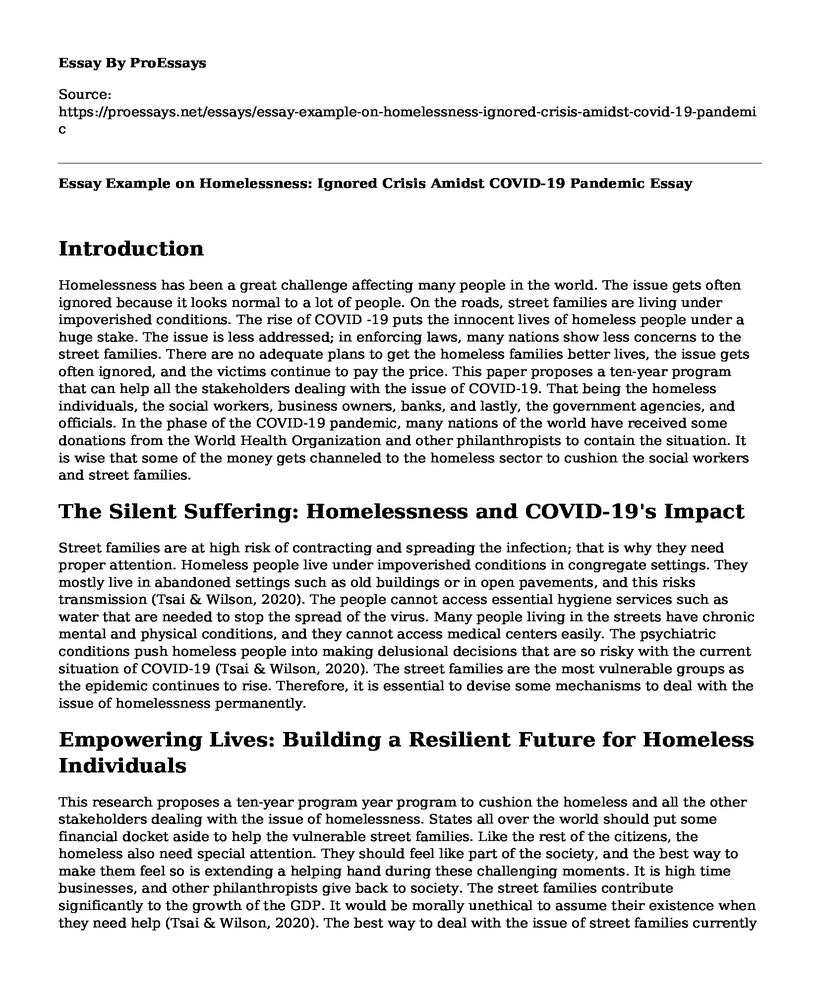Introduction
Homelessness has been a great challenge affecting many people in the world. The issue gets often ignored because it looks normal to a lot of people. On the roads, street families are living under impoverished conditions. The rise of COVID -19 puts the innocent lives of homeless people under a huge stake. The issue is less addressed; in enforcing laws, many nations show less concerns to the street families. There are no adequate plans to get the homeless families better lives, the issue gets often ignored, and the victims continue to pay the price. This paper proposes a ten-year program that can help all the stakeholders dealing with the issue of COVID-19. That being the homeless individuals, the social workers, business owners, banks, and lastly, the government agencies, and officials. In the phase of the COVID-19 pandemic, many nations of the world have received some donations from the World Health Organization and other philanthropists to contain the situation. It is wise that some of the money gets channeled to the homeless sector to cushion the social workers and street families.
The Silent Suffering: Homelessness and COVID-19's Impact
Street families are at high risk of contracting and spreading the infection; that is why they need proper attention. Homeless people live under impoverished conditions in congregate settings. They mostly live in abandoned settings such as old buildings or in open pavements, and this risks transmission (Tsai & Wilson, 2020). The people cannot access essential hygiene services such as water that are needed to stop the spread of the virus. Many people living in the streets have chronic mental and physical conditions, and they cannot access medical centers easily. The psychiatric conditions push homeless people into making delusional decisions that are so risky with the current situation of COVID-19 (Tsai & Wilson, 2020). The street families are the most vulnerable groups as the epidemic continues to rise. Therefore, it is essential to devise some mechanisms to deal with the issue of homelessness permanently.
Empowering Lives: Building a Resilient Future for Homeless Individuals
This research proposes a ten-year program year program to cushion the homeless and all the other stakeholders dealing with the issue of homelessness. States all over the world should put some financial docket aside to help the vulnerable street families. Like the rest of the citizens, the homeless also need special attention. They should feel like part of the society, and the best way to make them feel so is extending a helping hand during these challenging moments. It is high time businesses, and other philanthropists give back to society. The street families contribute significantly to the growth of the GDP. It would be morally unethical to assume their existence when they need help (Tsai & Wilson, 2020). The best way to deal with the issue of street families currently is to offer them safer places where they can call home. The families should be tested and given regular medical attention to keep them safe. The families need clean water and adequate food supply to keep them healthy during the epidemic (Tsai & Wilson, 2020). However, this is just for the short term; the ten year-program can help deal with the issue of homelessness and enhance sustainability.
To make the ten-year program realistic, states should focus on constructing permanent homes for the homeless to ensure that they are stable. The target should be to rehabilitate as many street families as possible; these people need places to call home (Tsai & Wilson, 2020). States should focus on educating the street children to equip them with the knowledge to turn things around. Vocational training for older people in the streets can provide them with the experience to transform their lives. Organizations also need to give back to the community by offering employment opportunities to the street groups. These people have lots of skills that can get tapped to enhance the success of companies. Street families have a lot of potentials, only that they do not have the right platforms to unlock what they have. All the necessary stakeholders need to work collectively to address the issue of homelessness. The homeless, social workers, philanthropists, and state all need to come together to devise long term solutions.
Conlusion
In a nutshell, the issue of COVID-19 rise is posing a risk to many homeless families. The homeless are the most vulnerable groups considering the situations they live I; fragmented settings that are impoverished. Most of the street people have psychiatric and physical conditions that may impair their decisions during this delicate moment. Governments of the world must devise some long term mechanisms to address the issue of homelessness. A ten- year program involving all the necessary stakeholders in the homelessness sector can help attain a resilient solution to the problem. COVID-19 is on the rise; nations should act fast to ensure that street families get the attention they deserve.
Reference
Tsai, J., & Wilson, M. (2020). COVID-19: A potential public health problem for homeless populations. The Lancet Public Health, 5(4). DOI:10.1016/s2468-2667(20)30053-0
Cite this page
Essay Example on Homelessness: Ignored Crisis Amidst COVID-19 Pandemic. (2023, Jul 02). Retrieved from https://proessays.net/essays/essay-example-on-homelessness-ignored-crisis-amidst-covid-19-pandemic
If you are the original author of this essay and no longer wish to have it published on the ProEssays website, please click below to request its removal:
- Paper Example on Patient Protection Law
- Critical Evaluation of Auto Liberation by Knutson Article
- Paper Example on Queensland: Population, Age Gaps, and Economic Status
- Essay Example on Stop Smoking: Poster Encourages Ethical Behavior and Prevention
- Whole 30 Diet Program: Avoiding Health Issues & Living a Healthy Life - Essay Sample
- Essay on Rhetorical Strategies and Fallacies in President Obama's Call for Health Reform Mobilization
- Discovering Individuality: An Essential Part of Medicine - Essay Example







